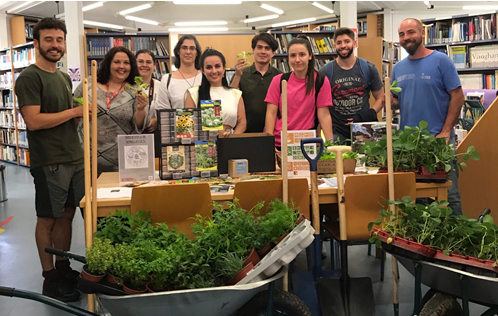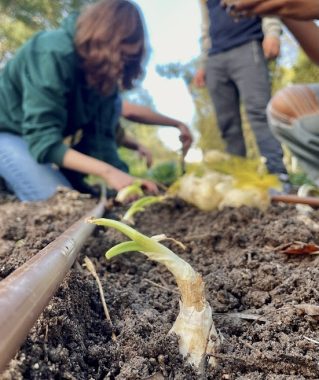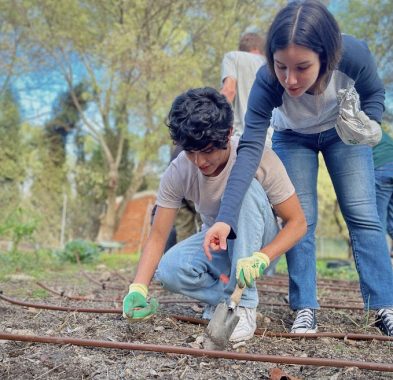Ecohuerta (Universidad Camilo José Cela, Spain)
Honorable Mention, 2023 MacJannet Prize
The Organic Vegetable Garden, or Ecohuerta, was started in November 2020 with the aim of creating a sustainable community within Universidad Camilo José Cela. This entrepreneurial project, aligned with the 2030 Sustainable Development Goals, involves the creation of a vegetable garden under the principles of organic agriculture, maintained by an extended intergenerational and multidisciplinary community. It is a learning and collaborative work experience with a holistic approach, aimed at raising awareness of the benefits that organic farming and the circular economy bring to the health and well-being of people and the planet.
Originally a cross-disciplinary project for undergraduate students of Law, Urban Management, Psychology and Protocol & Event Management, the urban garden project has been continued, taking different forms and involving more students and faculty members. It has since crossed the boundaries of the university campus, and involved the primary and secondary students of the international school beside the university, El Castillo, part of the same educational group, SEK. This academic year alone, 145 students have been involved in the garden, between the ages of 6 and 22, as well as 22 staff members. The project’s inclusion in a cross-curricular programme at the university, La Colmena, which equips students with transversal skills to tackle real-world problems via hands-on learning, has solidified the Ecohuerta’s place in university life. The Impact Lab, UCJC’s entrepreneurship accelerator, has helped with the funding side of the maintenance. The university’s library has opened a seed bank using seeds from this garden and made it available to anyone interested in planting. Campus catering staff have begun an organic waste disposal system to provide compost for the project. A plan has been put in place to plant similar gardens on the university’s city-centre campus and one of the school campuses, using the same overall model.

Other members of the community have become involved more indirectly through seed banks, educational visits, visits by members of other urban garden projects, and, importantly, the urban gardens that student and staff collaborators have planted in their own homes using skills and knowledge learned at UCJC’s Ecohuerta. In total, it is estimated that 4,732 people have benefitted from this project, both directly and indirectly, since its inception.
The vegetable garden is located on UCJC’s Villafranca campus, on a greenfield suburban site. It is managed under the principles of organic food production, local sourcing and economic, social and environmental sustainability. These values are taught to those collaborating in its upkeep, all while positively impacting the local community. Workshops are held all year round, and apart from the planting and maintenance of the crops, terrain and construction of structures, students are taught the theory of organic agriculture and the circular economy. This “apprenticeship” of a minimum of two hours per week helps students understand the earth’s natural systems and how to manage sustainable food production systems, uniting the care of the planet with human wellbeing. In parallel and almost involuntarily, those involved learn about the importance of a healthy, balanced diet and the psychological and physical benefits of producing their own high-quality, locally grown food.
UCJC’s students are the life blood of this project. Not only did the initiative originally come from one of them, who is still leading it today, but it is the students who continue to make the decisions by consensus and direct its course. In addition, they are responsible for the space, care of the garden, and a large part of the activities carried out, with the aim of raising awareness and generating systemic change from the classroom. The students are real agents of change as they discover and share new knowledge and skills with other classmates and members of the university community.
The project is aligned with numerous SDGs, namely zero hunger, health and wellness, quality education, sustainable cities and communities, responsible production and consumption, and relationships to reach the goals.

What students and staff say about the Ecohuerta:
“The eco-garden is a very special space, not only because of its great purpose and authenticity within the university, but also because of all the people who promote it, their concern and desire to make the world a better place”
– Iván Lez Benarroch, 2nd year Psychology student.
“For me, the eco-garden is a space for learning and relaxation. It helps me to distance myself from immediacy and enjoy the process without anxiety about the result. It makes me healthy on the inside and happy on the outside because the people who make up the core team are wonderful and always bring a smile to my face. It has been a pleasure to be part of the project from the beginning. I’m sure that next year we will be many more students and we will continue to take care of lettuce!”
– Paloma Frojan, 2nd year Digital Arts student.
“Participating in the Ecohuerta has been an incredible experience. I have had the privilege of sharing quality time with wonderful people, most of them students, with such a great, fresh perspective. I have realised how hard the physical work can be, and I have learnt to give greater value to the food I eat every single day. I have also had the opportunity to perceive first-hand the miracle of nature. You put a seed in land, you water it, and something grows, providing its fruit which is very enjoyable too. Everybody knows that, but for some reason (in the same way that you have seen lots of pictures of the Eiffel Tower), it is different when you see it with your own eyes. Thanks for allowing me to join the team!”
– Luis Moliner, IT Department.
“Being part of the Ecohuerta from the beginning has been a very rewarding experience both personally and in terms of work. Being able to facilitate training from the library related to the 2030 agenda, research, citizen science and content curation, and going down to the ecohuerta directly to work with students has created a very special community. Personally, it is a very enriching experience because it has allowed me to gain knowledge about nutrition and agriculture that I didn’t have, it has made me value food much more, especially healthy food. It has helped me to observe the rhythm and magic of nature, and to do so with the best possible community, made up of young people, students, seniors and co-workers who are a gift”
– Marta Isabel García Rodriguez, UCJC Library.